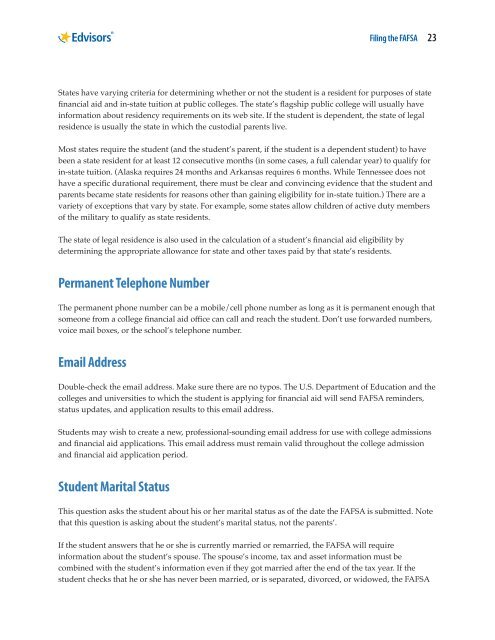filing-the-fafsa-2015-2016-edition
filing-the-fafsa-2015-2016-edition
filing-the-fafsa-2015-2016-edition
Create successful ePaper yourself
Turn your PDF publications into a flip-book with our unique Google optimized e-Paper software.
Filing <strong>the</strong> FAFSA 23<br />
States have varying criteria for determining whe<strong>the</strong>r or not <strong>the</strong> student is a resident for purposes of state<br />
financial aid and in-state tuition at public colleges. The state’s flagship public college will usually have<br />
information about residency requirements on its web site. If <strong>the</strong> student is dependent, <strong>the</strong> state of legal<br />
residence is usually <strong>the</strong> state in which <strong>the</strong> custodial parents live.<br />
Most states require <strong>the</strong> student (and <strong>the</strong> student’s parent, if <strong>the</strong> student is a dependent student) to have<br />
been a state resident for at least 12 consecutive months (in some cases, a full calendar year) to qualify for<br />
in-state tuition. (Alaska requires 24 months and Arkansas requires 6 months. While Tennessee does not<br />
have a specific durational requirement, <strong>the</strong>re must be clear and convincing evidence that <strong>the</strong> student and<br />
parents became state residents for reasons o<strong>the</strong>r than gaining eligibility for in-state tuition.) There are a<br />
variety of exceptions that vary by state. For example, some states allow children of active duty members<br />
of <strong>the</strong> military to qualify as state residents.<br />
The state of legal residence is also used in <strong>the</strong> calculation of a student’s financial aid eligibility by<br />
determining <strong>the</strong> appropriate allowance for state and o<strong>the</strong>r taxes paid by that state’s residents.<br />
Permanent Telephone Number<br />
The permanent phone number can be a mobile/cell phone number as long as it is permanent enough that<br />
someone from a college financial aid office can call and reach <strong>the</strong> student. Don’t use forwarded numbers,<br />
voice mail boxes, or <strong>the</strong> school’s telephone number.<br />
Email Address<br />
Double-check <strong>the</strong> email address. Make sure <strong>the</strong>re are no typos. The U.S. Department of Education and <strong>the</strong><br />
colleges and universities to which <strong>the</strong> student is applying for financial aid will send FAFSA reminders,<br />
status updates, and application results to this email address.<br />
Students may wish to create a new, professional-sounding email address for use with college admissions<br />
and financial aid applications. This email address must remain valid throughout <strong>the</strong> college admission<br />
and financial aid application period.<br />
Student Marital Status<br />
This question asks <strong>the</strong> student about his or her marital status as of <strong>the</strong> date <strong>the</strong> FAFSA is submitted. Note<br />
that this question is asking about <strong>the</strong> student’s marital status, not <strong>the</strong> parents’.<br />
If <strong>the</strong> student answers that he or she is currently married or remarried, <strong>the</strong> FAFSA will require<br />
information about <strong>the</strong> student’s spouse. The spouse’s income, tax and asset information must be<br />
combined with <strong>the</strong> student’s information even if <strong>the</strong>y got married after <strong>the</strong> end of <strong>the</strong> tax year. If <strong>the</strong><br />
student checks that he or she has never been married, or is separated, divorced, or widowed, <strong>the</strong> FAFSA


